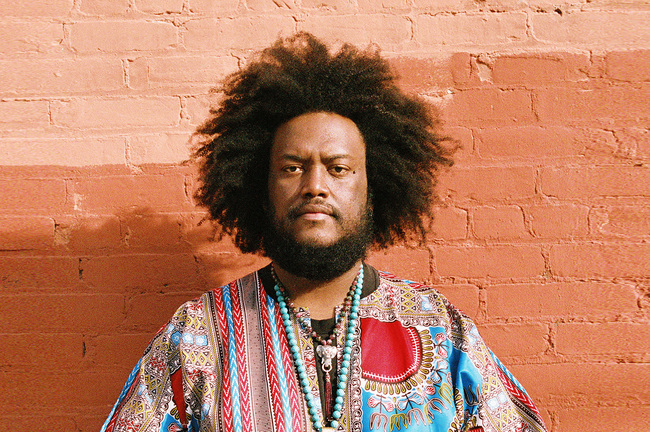Swing Time: Kamasi Washington

As a high profile jazz musician, Kamasi Washington is accustomed to improvising, just not in the ways that he’s been forced to over the past year. Like every other road warrior whose life revolves around touring and recording, the saxophonist, composer and bandleader— who turned 40 on Feb. 18—has been “waiting and seeing” for the past 12 months.
“I have all this raw music that I’ve been writing but I don’t really know where it’s gonna go yet,” he says. “Before anything else, we’ll probably start recording but it’s hard to know exactly what I want to do. I don’t think I’ve played this little since I started playing.
“I miss interacting with people,” he adds. “I think people are ready for life to come back. I don’t think they’re gonna have much apprehension about going out. Life in isolation is not good.”
All things considered, Washington has managed to keep busy during the pandemic. Most notably, he released the score for Becoming, Nadia Hallgren’s Netflix documentary on former First Lady Michelle Obama. The soundtrack was nominated for both a Grammy and an Emmy.
“It was a huge honor to work on that project,” Washington says. “Michelle Obama is an incredible person, and she has an incredible story—it’s enlightening to a lot of people.”
Creating the music for Becoming presented something of a new challenge for Washington, whose own albums—particularly 2015’s three-disc The Epic and 2018’s equally ambitious Heaven and Earth—have been sprawling, long-form works that took their time to tell their stories. Yet, for Becoming, Washington was tasked with composing music of exact lengths for precise points in the film, crafting pieces that in several cases run under two minutes. In fact, the score’s 15 tracks total just over a half hour of music.
“When I’m making my own music,” he says, “I change my mindset. I’m trying to capture a moment in time. I’ll leave a bunch of space so that the most special, amazing moments can happen. When I’m writing for a film, I’m not necessarily trying to catch a random moment; I’m trying to capture something very specific. It’s not hard to write a short piece of music, but it’s hard to capture an incredible moment in such a short period of time— in a frame. It’s almost like the difference between creating a painting versus going off in nature and finding a beautiful landscape to look at.”
Washington never met or even spoke to Obama while working on the music for Becoming, although he did receive notes from her via the filmmakers. “You can’t argue with the leaders of the free world,” he says with a laugh. “You kinda [have] to listen to them.”
In addition to the film score project, last year the saxophonist released Dinner Party, a collaborative, seventrack, chill R&B/jazz-flavored EP also featuring keyboardist Robert Glasper, musician/ producer Terrace Martin and rapper/producer Patrick Douthit, who is best known as 9th Wonder. The recording debuted at No. 1 on the Billboard Top Contemporary Jazz Albums. “That happened because we weren’t able to tour,” says Washington, “before everything went off whack. It was Terrace Martin’s idea.”
And there was Live at the Apollo Theater, a concert video/documentary featuring Washington and his regular 10-piece band performing for the legendary Harlem venue’s 85th anniversary in February 2019. For Washington and generations of artists before him, playing the Apollo was nothing less than “surreal, one of those things that you never imagine is going to happen to you when you’re starting out.”
That gig was particularly meaningful to Kamasi’s dad, multi-instrumentalist Rickey Washington, who is a featured soloist at most of Kamasi’s shows—the Apollo performance marked his first time setting foot on that stage. “When we were kids, my dad made a decision not be a touring musician, to stay at home and be there for us,” Kamasi says. “I’d see him playing around the house and around town, and I always wished he played more. When The Epic came out, I had my first tour coming up and he said, ‘You need another saxophone player?’ I was like, ‘Yeah!’ It’s something that I’ve always wanted for him, and he jumped on.”
Washington hopes that it won’t be much longer until they can pick up where they left off. “Everybody [in my band] is itching to get back to playing and creating, making music,” he says. “It definitely has a psychological effect [to be kept from playing]. You start to feel torn away from yourself. Plus, the [venue] infrastructure that was there—it’s hard to know exactly how much of that will still be there and how damaged it is. So much of that industry has been hit hard.
“But I think everybody is able to see the bigger picture and see that there’s a light at the end of the tunnel,” he says. “We’ve all gotten used to the idea of not really getting our hopes up, so we’ve just used this time to write or study. I’m just trying to take the open approach and enjoy today and keep positive in my own heart.”




















